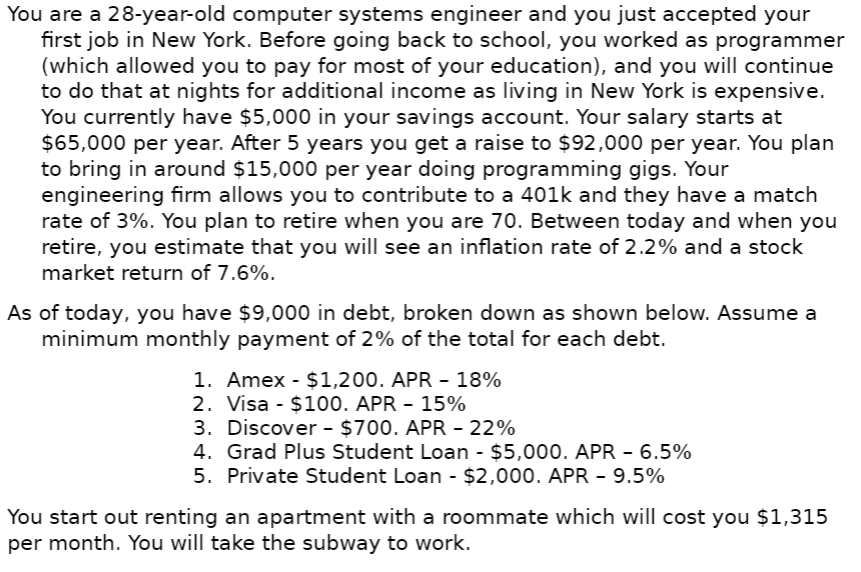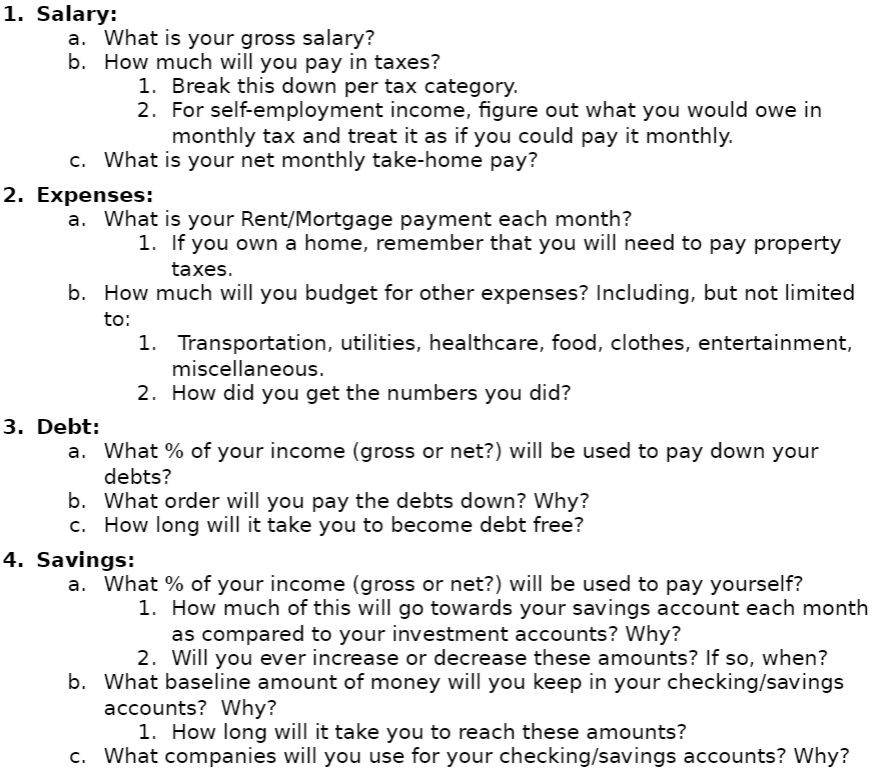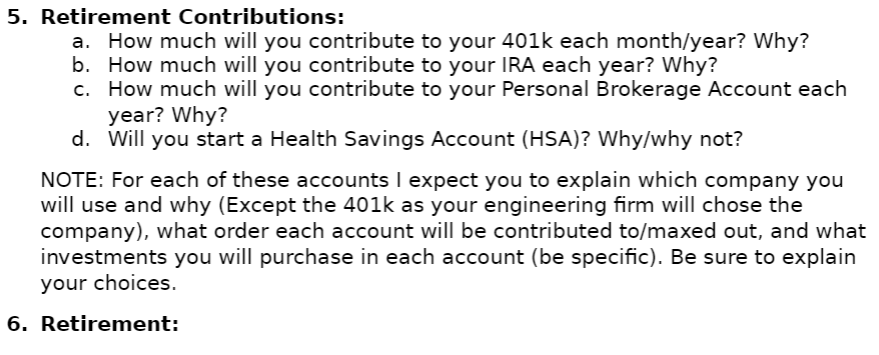



You are a 28-year-old computer systems engineer and you just accepted your hrst job in New York. Before going back to school, you worked as programmer (which allowed you to pay for most of your education), and you will continue to do that at nights for additional income as living in New York is expensive You currently have $5,000 in your savings account. Your salary starts at $65,000 per year. After 5 years you get a raise to $92,000 per year. You plan to bring in around $15,000 per year doing programming gigs. Your engineering firm allows you to contribute to a 401k and they have a match rate of 3%. You plan to retire when you are 70, Between today and when you retire, you estimate that you will see an inflation rate of 2.2% and a stock market return of 7.6%. As of today, you have $9,000 in debt, broken down as shown below. Assume a minimum monthly payment of 2% of the total for each debt. 1, Amex-$1,200. APR-18% 2. Visa-$100. APR-15% 3. Discover-$700. APR-22% 4. Grad Plus Student Loan-$5,000. APR-6.5% 5, Private Student Loan-$2,000. APR-9.5% You start out renting an apartment with a roommate which will cost you $1,315 per month. You will take the subway to work. 1. Salary: a. What is your gross salary? b. How much will you pay in taxes? 1. Break this down per tax category. 2. For self-employment income, figure out what you would owe in monthly tax and treat it as if you could pay it monthly. c. What is your net monthly take-home pay? 2. Expenses: a. What is your Rent/Mortgage payment each month? 1. If you own a home, remember that you will need to pay property taxes b. How much will you budget for other expenses? Including, but not limited to: 1. Transportation, utilities, healthcare, food, clothes, entertainment, miscellaneous. 2. How did you get the numbers you did? 3. Debt: a. What % of your income (gross or net?) will be used to pay down your debts? b. What order will you pay the debts down? Why? c. How long will it take you to become debt free? 4. Savings: a. What % of your income (gross or net?) will be used to pay yourself? 1. How much of this will go towards your savings account each month as compared to your investment accounts? Why? 2. Will you ever increase or decrease these amounts? If so, when? b. What baseline amount of money will you keep in your checking/savings accounts? Why? 1. How long will it take you to reach these amounts? c. What companies will you use for your checking/savings accounts? Why? 5. Retirement Contributions: a. How much will you contribute to your 401k each month/year? Why? b. How much will you contribute to your IRA each year? Why? c. How much will you contribute to your Personal Brokerage Account each year? Why? d. Will you start a Health Savings Account (HSA)? Why/why not? NOTE: For each of these accounts I expect you to explain which company you will use and why (Except the 401k as your engineering firm will chose the company), what order each account will be contributed to/maxed out, and what investments you will purchase in each account (be specific). Be sure to explain your choices. 6. Retirement: a. What yearly income will you need in retirement? Explain how you came up with this number. b. How much will your retirement portfolio need to be worth to supply that yearly income? c. Explain the logic behind your chosen yearly withdrawal rate. You are a 28-year-old computer systems engineer and you just accepted your hrst job in New York. Before going back to school, you worked as programmer (which allowed you to pay for most of your education), and you will continue to do that at nights for additional income as living in New York is expensive You currently have $5,000 in your savings account. Your salary starts at $65,000 per year. After 5 years you get a raise to $92,000 per year. You plan to bring in around $15,000 per year doing programming gigs. Your engineering firm allows you to contribute to a 401k and they have a match rate of 3%. You plan to retire when you are 70, Between today and when you retire, you estimate that you will see an inflation rate of 2.2% and a stock market return of 7.6%. As of today, you have $9,000 in debt, broken down as shown below. Assume a minimum monthly payment of 2% of the total for each debt. 1, Amex-$1,200. APR-18% 2. Visa-$100. APR-15% 3. Discover-$700. APR-22% 4. Grad Plus Student Loan-$5,000. APR-6.5% 5, Private Student Loan-$2,000. APR-9.5% You start out renting an apartment with a roommate which will cost you $1,315 per month. You will take the subway to work. 1. Salary: a. What is your gross salary? b. How much will you pay in taxes? 1. Break this down per tax category. 2. For self-employment income, figure out what you would owe in monthly tax and treat it as if you could pay it monthly. c. What is your net monthly take-home pay? 2. Expenses: a. What is your Rent/Mortgage payment each month? 1. If you own a home, remember that you will need to pay property taxes b. How much will you budget for other expenses? Including, but not limited to: 1. Transportation, utilities, healthcare, food, clothes, entertainment, miscellaneous. 2. How did you get the numbers you did? 3. Debt: a. What % of your income (gross or net?) will be used to pay down your debts? b. What order will you pay the debts down? Why? c. How long will it take you to become debt free? 4. Savings: a. What % of your income (gross or net?) will be used to pay yourself? 1. How much of this will go towards your savings account each month as compared to your investment accounts? Why? 2. Will you ever increase or decrease these amounts? If so, when? b. What baseline amount of money will you keep in your checking/savings accounts? Why? 1. How long will it take you to reach these amounts? c. What companies will you use for your checking/savings accounts? Why? 5. Retirement Contributions: a. How much will you contribute to your 401k each month/year? Why? b. How much will you contribute to your IRA each year? Why? c. How much will you contribute to your Personal Brokerage Account each year? Why? d. Will you start a Health Savings Account (HSA)? Why/why not? NOTE: For each of these accounts I expect you to explain which company you will use and why (Except the 401k as your engineering firm will chose the company), what order each account will be contributed to/maxed out, and what investments you will purchase in each account (be specific). Be sure to explain your choices. 6. Retirement: a. What yearly income will you need in retirement? Explain how you came up with this number. b. How much will your retirement portfolio need to be worth to supply that yearly income? c. Explain the logic behind your chosen yearly withdrawal rate










